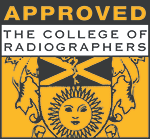Professional/Short course Fundamental Applications of Computed Tomography
30 credit level 7 module
Page last updated 4 March 2024
Introduction
On successful completion of this 30 credit Fundamental Applications of Computed Tomography (level 7) module, you will be able to:
- critically evaluate CT protocols for various anatomical regions
- demonstrate a critical knowledge of the legal, ethical and organisational aspects of current practice in Computerised Tomography
- critically evaluate contemporary research concerning CT technology in order to inform practice, and implement new approaches where appropriate
- critically evaluate the contribution that CT makes to diagnostic tests/procedures in the context of differential diagnosis
- perform a comprehensive range of CT procedures skillfully, safely, and to a high standard, demonstrating an ability to adapt effectively to new or unusual situations
- justify the contribution and the role of CT to the overall management of patients.
Entry requirements
To be eligible for admission, you must have a radiography professional qualification or relevant clinical Computed Tomography (CT) experience
Structure
Content
The syllabus for this level 7 (Masters level) module typically covers:
Clinical protocols
- Rationale for the use, adaptation and development of CT acquisition protocols in diagnostic CT units.
- Consideration for patient preparation including:
- Head, neck, neurology and ear, nose and throat (ENT)
- Cancer staging (neck. chest, abdomen and pelvis)
- Angiography
- Trauma (Head)
- Trauma/Orthopaedics
- Respiratory (pulmonary embolism/lung cancer/4DCT)
- Cardiac imaging (fundamental knowledge)
- CT colonography (screening and symptomatic).
Management and organisation
- Consideration for organisation and management of CT service provision
- Ethical and legal issues relating to CT practice, to include Ionising Radiation (Medical Exposures) Regulations (2000) (IR(ME)R) and Ionising Radiation Regulations (IRR) (1999).
Patient care
- Evaluate patient care, preparation and quality enhancement to service delivery
- Contrast the scanning requirements of specialist patient groups including anaesthetised, sedated and paediatric patients
- Appraise the use of contrast agents within CT relating to risk/benefit issues and dealing with adverse reactions.
Learning and Teaching
Scheduled learning
Teaching and learning methods will include, but not be limited to, asynchronous delivery of lecture material through narrated presentations, notes and other guided reading, VLE discussion board fora with specific objectives, workplace tasks, and other study tasks deemed appropriate to the development of student knowledge. Formative feedback on allocated study tasks will be provided.
Independent learning
Includes hours engaged with essential reading, case study preparation, assignment preparation and completion etc. These sessions constitute an average time per level as indicated in the table below.
Placement learning
Students on this module will be working in the field of Computed Tomography. There will be competency based tasks to complete locally as per the clinical portfolio component. This will be assessed with on-site Mentors.
Study time
Contact hours will be achieved via blended learning education.
- Some material will be videoed lectures made available on Black-Board for all learners. Learners will have the option to attend these recordings but this will not be compulsory.
- Subject specific vodcasts with associated self-directed leaning tasks.
- Work-based appraisal completion.
Contact with the module leader for discussion of module-related issues will be facilitated by email, telephone conversations and discussion boards.
Assessment
A practice-based portfolio and a 2,500 word written assignment will be used to assess the achievement of the learning outcomes.
Features
Study facilities
The College of Health, Science and Society has an excellent reputation for the quality of its teaching and the facilities it provides.
Get a feel for the Health Professions facilities we have on offer here from wherever you are.
Prices and dates
Supplementary fee information
Please visit the full fee information to see the price brackets for our modules.
Please note: Funding may be available to support your learning. Please contact your Trust Education Lead. If you work in the private, independent and voluntary sector, please contact your employer who will advise you.
Dates
Please click on the Apply Now button to view dates.
How to apply
How to apply
Please click on the Apply Now button to apply for your CPD module, which you can take as a stand-alone course or as part of an undergraduate or postgraduate (Masters level) programme.
Extra information
If the course you are applying for is fully online or blended learning, please note that you are expected to provide your own headsets/microphones.
For further information
- Email: pd@uwe.ac.uk
- Telephone: +44 (0)117 32 81158
